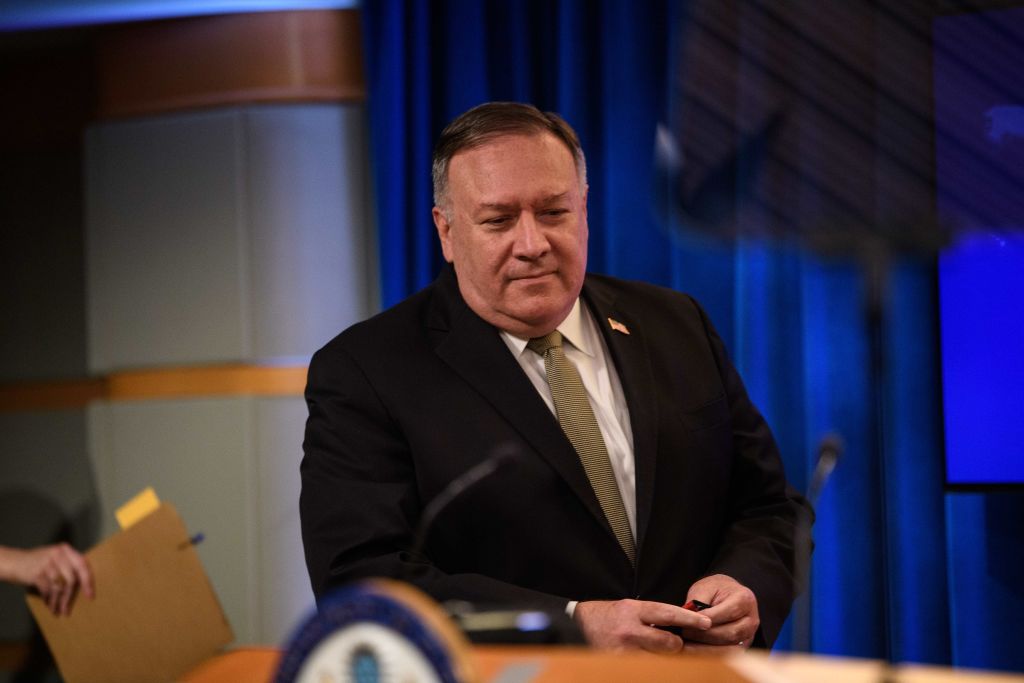Washington DC
In an exclusive interview at the State Department, Secretary of State Mike Pompeo described on Monday his anticipation of the signing of the Abraham Accords at the White House between Israel and the UAE and Bahrain as ‘a joyous day’.
Pompeo also warned that if Joe Biden wins the November elections, an incoming Democratic administration would revive the Iran Deal ‘on Day One’ and ‘return what would amount to hundreds of billions of dollars to a theocratic, corrupt regime’. This, he argued, would ‘undermine all the good work that has been done to date’, and raise the risk ‘that the normalizations won’t continue’.
The Abraham Accords, Pompeo says, are the fruit of ‘years of hard work’ by the Trump administration, the Department of Defense, the State Department and teams from the White House. President Trump, he says, made it possible by flipping the received wisdom ‘on its head’.
‘That theory was, you had to solve the Palestinian problem before nations could recognize Israel. We’ve said, “No, we have to break the mold.” We need to move forward in a different direction.’ After the Obama administration’s tilt toward Iran, the Trump administration, Pompeo said, had assured Israel and the Gulf states that they have ‘a real partner in the United States’.
Reviving the Iran Deal, Pompeo warns, would be ‘the wrong policy’, and would endanger the US-brokered Israeli-Arab breakthrough: ‘I think all of that would be at risk.’
The UAE and Bahrain, he says, ‘realize it is in their shared interest to acknowledge Israel’s right to exist and to have normal relationships, commercial relationships with them, security relationships with them… If the United States’ foreign policy were to return to where it was four years ago, I think there’s real risk that this common threat from the Islamic Republic of Iran would undermine all the good work that has been done to date, that the normalizations won’t continue.’
On Saturday, Pompeo participated in Qatar-brokered talks with Afghan factions including the Taliban. ‘We made a commitment that we all have our forces out by a certain set of conditions need to be met. And we took a step towards that on Saturday in Doha.’
[special_offer]
The talks, he said, were ‘really remarkable. That doesn’t seem like much, to have people sitting in a room together and talk. But it’s been 19 years, and multiple administrations trying to achieve that very meeting. And it was a successful day. There are conversations that were had [that] moved us further in the right direction.’
The goal, Pompeo said, is ‘to reduce our footprint’ in Afghanistan, Iraq and Syria: to ‘reduce the risk to American lives and treasure’ and those of Nato allies, while ‘still delivering the security’. He is ‘very confident that we can achieve that’, and that it can be done in Iraq without a permanent US military presence:
‘I believe that it is. Watch these popular forces, watch the Iraqi protesters and watch the protesters in Lebanon and what they’re asking for, and the protesters in Belarus. People have now found footing, found their voice in each of these places. And I think that’s certainly true in Iraq, that they’re tired of Iranian influence. The protests are demanding Iraqi sovereignty… They want the Iranians out… They want the monopoly on arms to be in the hands of the Iraqi government. Those are the kind of things that we’ve been working on in our strategic dialogue with the Iraqis. And so the decision to withdraw from about 5,000 to about 3,000 [US personnel] was made in concert with the Iraqi government, consistent with the twin missions of continuing our counterterrorism campaign and helping the new leadership there be successful and, importantly, responding to the Iraqi people… I’m convinced it’s trending in the right direction.’





















